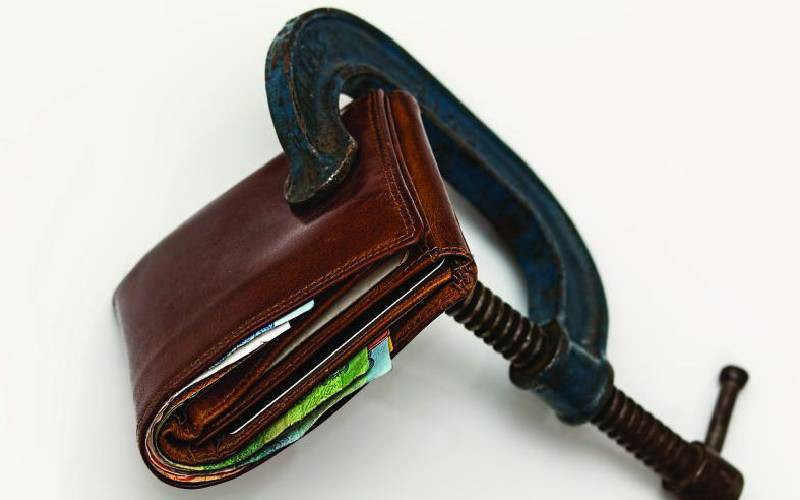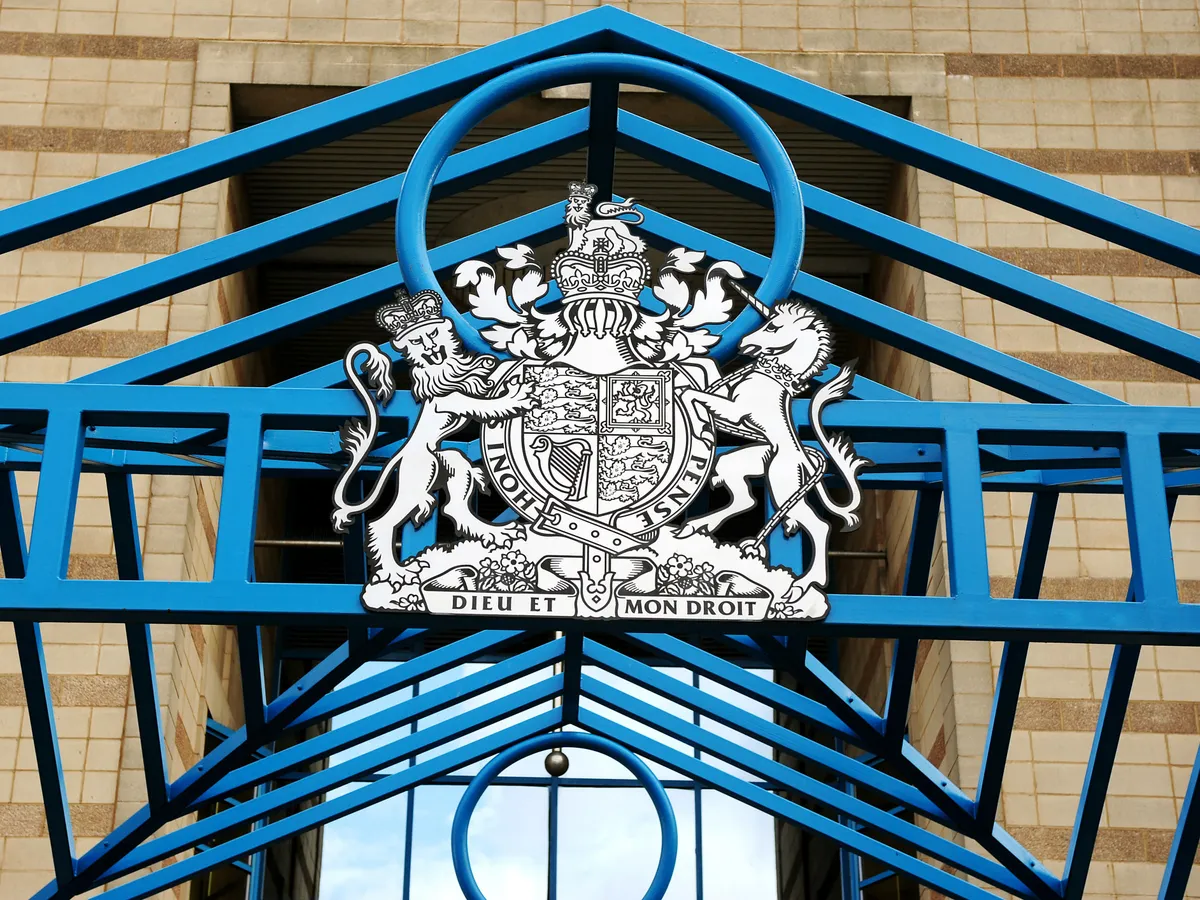By Brian Ngugi And Macharia Kamau,Standard Business
Copyright standardmedia

Many Kenyans are resorting to shylocks to meet quick financial needs, often ending up forfeiting assets. [Courtesy]
Harsh economic times, the high cost of living, and the denial of credit by banks to households and businesses have forced many Kenyans into backstreet borrowing that is now pushing them to the edge.
Many are resorting to shylocks to meet quick financial needs, often ending up forfeiting assets. Victims of these unregulated digital lenders tell of battling depression, with some cases ending in suicide.
Reports show that families are skipping meals as breadwinners divert the little they have to service loans. The lenders, preying on Kenyans’ vulnerability, offer quick but exorbitantly priced credit.
The lenders, tapping on the vulnerability of Kenyans, offer easy to access but exorbitantly priced loans.
In addition to the effects of Covid-19 that left many without jobs, the high taxes have resulted in thinning payslips for those still in employment, giving way to a thriving shylock industry.
And the self-employed have not been spared, with their earnings eroded, with their customers unable to spend and also faced with higher cost of doing business.
When prominent lawyer Kyalo Mbobu was last shot dead in mysterious circumstances, it emerged that he had been blacklisted by local banks and was dependent on shylocks.
His banking history is one of the lines being pursued by the Directorate of Criminal Investigations (DCI).
In one instance, Mbobu reportedly borrowed Sh10 million from a shylock five years ago but soon defaulted on repayments. By the time he died, he reportedly owed the shylock Sh72 million.
Mbobu’s case is a reflection of many Kenyans who are suffering silently under the hands of shylocks.
The heartache that comes with dealing with debt collectors from digital lenders, which are seen to be a mutation of the traditional shylock backed by venture capital billions, is one that Mercy Njeri knows only too well.
On a recent Friday morning in Naivasha town, Njeri’s phone rang. Her heart sank. It was a number she did not recognise, but she knew exactly who was on the other end: A debt collector from a digital lender.
A month before, Njeri, a civil servant, had borrowed Sh5,000 to cover her son’s school trip. Now, with the interest and penalties, the amount has ballooned to over Sh8,000.
Her salary, already squeezed by taxes, is no match for the predatory repayment schedule. Mercy, a single mother, is not an outlier, analysts say; she is a mirror reflecting a national financial crisis, a silent epidemic of debt distress consuming an entire generation.
“My salary is gone before I even receive it. I’m just taking one loan to pay another, and it’s a living nightmare,” said Mercy in an interview.
“They threaten you, they call your friends, they have no mercy.”
The exorbitant nature of the shylock loans makes many borrowers to default with creditors resorting to harassment and threats as they demand back their money.
And when the loans are due, many borrowers wary of the crude debt collection methods by both digital lenders and shylocks are now foregoing meals to service the debts, according to the FinAccess Household Survey 2024.
“Strategies employed by households in debt repayment and resolving household indebtedness in 2024 included cutting down on other expenses (food and non-food), ran down savings, looked for additional work or business and took another loan to repay,” said the FinAccess Survey. “The most popular action to repay is by reducing expenses on food with females.”
The survey noted that hard hit are women, whereby 63 percent reported reducing expenses on food to service debt compared to 57.1 percent of men who participated in the survey.
The data from the Survey, which is conducted by Central Bank and its partners, provides a chilling quantification of this human-driven crisis.
The survey indicated 16.6 per cent of Kenyan borrowers defaulted on their loans, a significant increase from 10.7 per cent in 2021.
The report also reveals that financially unhealthy individuals have an alarmingly high probability of default, with 80.4 per cent of them defaulting in the 2024 survey.
In yet another publication – Financial Sector Stability Report (FSR) 2024, CBK confirms what Kenyans feel in their bones: A nation in a debt trap.
The report reveals a staggering surge in the banking sector’s gross non-performing loans (NPLs), which swelled to a record Sh697.29 billion by the end of 2024. For a country of entrepreneurs and hardworking citizens, this isn’t just an economic statistic; it’s a measure of shattered dreams and broken promises.
This has been exacerbated by a tight monetary policy designed to stem inflation, which, in turn, has slowed employment opportunities, elevated poverty, and debt distress.
Formal sector workers, once seen as the anchor of the economy, are now among the most vulnerable. In addition to the shocks, Kenyans have had to contend with a flurry of taxes and levies for the past three years under President William Ruto’s administration. Some of recent tax hikes that have had a major impact.
According to Auditor General Nancy Gathungu, the combined effect of the housing levy and the Social Health Insurance Fund has seen tens of thousands of civil servants take home less than a third of their gross pay, in direct contravention of the Employment Act.
In response, the Salaries and Remuneration Commission (SRC) has had to initiate a comprehensive review of public sector salaries to lessen this financial burden and comply with the law.
As the financial pressure intensifies, the formal banking sector is offering little refuge. The FSR notes that lending to individuals and businesses remains low as banks prefer the safety and lucrative returns of lending to the government.
This vacuum has created a booming and largely unregulated shadow economy of digital credit providers.
These lenders have become the go-to financiers for those who cannot navigate the stringent loan terms, paperwork, and long waiting periods of banks and Saccos.
But the relief offered by digital loans is often a wolf in sheep’s clothing. The FSR describes them as “expensive, short term, and not appropriate for long-term investment” highlighting their significant impact on a borrower’s income.
Worse, it notes that some lenders extend credit in a manner that “creates dependency and traps borrowers in debt”. The Financial Sector Regulators Forum (FSRF) report also warns that poor economic performance and predatory lending, coupled with irresponsible borrowing, “accentuate debt distress”.
These lenders are increasingly using communication and transaction data to vet borrowers, a practice that, while intended to manage risk, often locks out the most financially fragile.
“What we are seeing is the emergence of a ‘shylock economy,’ a financial ecosystem where desperation drives demand, and predatory lenders fill the void left by a formal banking sector that has turned its back on the average Kenyan,” said Ian Njoroge, an independent based analyst.
For those locked out of both formal banking and the digital lending space, the last resort is often the most dangerous: The shylock.
Charging upwards of 30 per cent interest for short term loans, they are the loan sharks of the streets, operating with a ruthless efficiency that makes no room for empathy. The exorbitant nature of these loans makes defaulting almost inevitable, leading to a frightening escalation of threats and harassment.
CBK started moving towards regulating digital lenders in 2020, acting on reports of rampant debt shaming by debt collectors of the loan apps. A few Kenyans had been reportedly driven to suicide due to threats from the representatives of the lenders. CBK has licensed 153 digital lenders as of this month. These are however a fraction as CBK says it has received over 700 applications for licences from digital lenders.
While those that are licensed exhibit some degree of decorum, they still charge exorbitant rates.
CBK has recently announced the issuance of a revised Risk-Based Credit Pricing Model (RBCPM) to promote responsible lending. The Draft Central Bank of Kenya (Non-Deposit Taking Credit Providers) Regulations, 2025 is also seen as a clear attempt to formalise and sanitise the digital lending space.
However, for a nation on the brink of financial despair, these regulatory actions, while necessary, feel like a distant effort. The shylock’s dread is real. It is the palpable fear that grips a parent when their child is sent home for school fees, the humiliation of a public shaming on social media by a debt collector, and the cold reality that the promise of a better life is increasingly out of reach.
The CBK’s next Monetary Policy Committee meeting will be on October 7, and the stakes could not be higher. They will not only be deliberating on economic policy, but on the future of an entire population living on the financial edge, one paycheck at a time.



